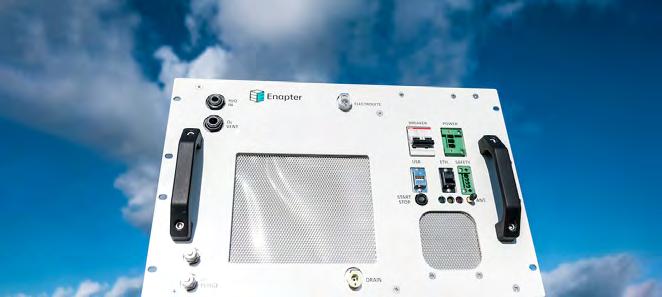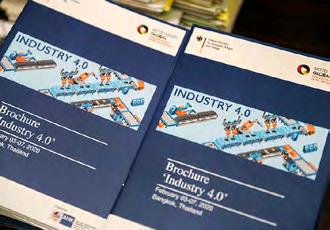
7 minute read
SPACE-F Accelerator Demo Day: Food-tech startups pitch and meet with investors
SPACE-F, the first global food-tech startup incubator and accelerator in Thailand, hosted a ‘Demo Day’ to allow a group of Thai and international startups to present their companies to a group of investors on 5 March 2020.
After spending the past four months in the SPACE-F programme, co-founded by Thai Union Group PCL, Mahidol University and the National Innovation Agency, Thai and international star tups presented their companies to a group of investors at SPACE-F Demo Day.
Advertisement
The seven startups, whose business models for their ideas and products were developed during the SPACE-F Accelerator programme, delivered presentations to about 70 guests including venture capitalists, investors and representatives from commercial and financial institutions based in Thailand. Their products are now being fine-tuned to the needs of the market and customers.
“SPACE-F was established with the intention not only to help food-tech startups to grow
and be successful, but also to create a food-tech ecosystem. The programme has been a proofpositive of collaboration between the Government ofThailand, academia and the private sector in contributing to the industry,” Thai Union Group CEO, Mr. Thiraphong Chansiri explained.
“As one of the world’s leading seafood producers, we are committed to innovation as a key driver of our future success. We continue to offer innovative products to consumers and keep pace with continuous lifestyle changes and sustainability impacts,” he emphasised.


Enapter reveals new electrolyser EL 2.1
On 26 February 2020, Enapter presented the new model of the patented AEM electrolyser – the EL 2.1 – at the International Hydrogen and Fuel Cell Expo 2020 in Tokyo. A year after Enapter introduced its first electrolyser, the new generation hydrogen generator significantly improves the design of its predecessor. The EL 2.1 consumes 8 per cent less energy and is significantly smaller, which translates into a 20 per cent reduction in space requirement.
Enapter’s unique approach to hydrogen generation is to produce a standardized, scalable and

flexible electrolyser. “We are very close to METI’s efficiency goal for 2030 – 10 years ahead of time. Today, we only need 4.4 kilowatt hours of electricity to produce one cubic metre of hydrogen gas,” according to Mr. Sebastian-Justus Schmidt, Chairman of Enapter. “Demand for hydrogen is expected to grow by a factor of 1,000 or more by 2030 – decentralized systems producing hydrogen on-site with no transportation cost will make a huge difference.”
A more compact EL 2.1 allows system integrators to deploy the modular electrolyser in all kinds of applications, including energy storage, Power-to-X, refuelling and industrial use. Due to the lower operating and standby level of power consumption, the energy efficiency and cost-effectiveness of customers’ overall solutions improve, Mr. Schmidt explained.

Thai-German Conference on Industry 4.0

On 4 February 2020, the German-Thai Chamber of Commerce (GTCC) organised the Thai-German Conference on Industry 4.0, supported by the German Federal Ministry for Economic Affairs and Energy (BMWi), at the Eastin Grand Hotel Sathorn in Bangkok. The conference attracted more than 120 participants from various business sectors as well as institutions, who wanted to learn more about the opportunities, challenges, and trends of Industry 4.0 in Thailand and Germany. GTCC Executive Director, Dr. Roland Wein, opened the conference and emphasised the role of Thailand and Germany as key industry powerhouses and manufacturing hubs in their respective regions as well as both countries’ deep integration into global supply chains. He highlighted the importance of investments in new production technology to maintain Thailand’s status as the production hub of ASEAN in various key industries.
Dr. Wein also introduced the Platform Industrie 4.0, a German initiative to promote and expand Germany’s leading international position in the manufacturing industry. His speech was followed by special remarks by Dr. Alexander Raubold, Counsellor Economic and Commercial Affairs at the German Embassy to Thailand.
Keynote speaker Dr. Prapin Abhinorasaeth, President of the Thai Automation and Robotics Association (TARA), fur ther

explained the concept of Thailand 4.0 and its approach to drive the level of automation in production in the Thai industry as well as the development of Thailand as an “innovation driven industrial nation”. The role of TARA in the robotics and automation innovation development mechanisms especially focuses on the development of automation system integrators, supply chain solutions, and prototypes for production.
Next, Mr. Chokedee Kaewsang, Deputy Secretary-General of the Thailand Board of Investment (BOI), offered an insight into the role of the BOI in the development of Thai Industry 4.0. In this context, he stated that the BOI offers support to investors by offering an investment incentive scheme. This is subdivided into investment tax incentives, which differ in respect to their activity-based or technology-based nature and non-tax incentives. Additional incentives include merit-based incentives and also area-based incentives that focus on the development of certain regions in Thailand such as the EEC provinces. He made it clear that the BOI aims to support manufacturers as well as users of robotics and automation solutions.
Mr. Thomas Hundt, Director of German Trade & Invest in Thailand, explained that Germany is the world’s leading Industry 4.0 nation. The German manufacturing industry spent last year EUR 58 billion on research and development and digital solutions transform the German economy and society. He mentioned German industries and companies who made the leap from abstract Industry 4.0 concepts to a
tangible reality and where German Industry 4.0 applications and technologies have moved from the test lab to the factory floor. For example, robotics and automation industry is one of the most innovative branches within the mechanical engineering sector in Germany. German electronics and sensors help transform production into cyber-physical systems. Therefore, he invited companies from Thailand to join and shape the digital transformation in Germany. On top investors from Thailand can count on generous Industry 4.0 support by the European Union, national programmes, from local authorities and by Germany Trade & Invest. His team of Industry 4.0 experts will assist in setting up operations in Germany. Germany Trade & Invest supports project management activities from the earliest stage.
Representatives of the following nine selected German companies provided a shor t presentation about their companies and its technology solutions. They included: Mr. Enrico Sielaff from gerenga Germany GmbH; Mr. Andreas Förster from BBS Automation; Mr. Karl-Heinz Brozkowski from soffico GmbH; Mr. Sarawut Laoprasert from SSI Schaefer; Mr. Klaus Hermsen from celano GmbH; Ms. Irina Kouzmenko from Allvig Technology GmbH; Mr. Chris Schürholz from Geutebrück GmbH; Ms. Josefine Walter from invenio GmbH Engineering Services; and Mr. Shreerup Singha from blue automation GmbH.
After the company presentations, the panelists Dr. Djitt Laowattana, representing the Institute of Field Robotics (FIBO), Dr. Katiya Greigarn, board member of FTI and former chairman of the Committee of Industry 4.0, and Dr. Tunyawat Somjaitaweeporn, Director of the Innovation Centre for Automation and Robotics (iCRAS) at the Panyapiwat Institute of Management (PIM), engaged in a discussion

on “Industry 4.0 insights Thailand – status quo and the journey ahead”. Mr. Martin VenzkyStalling, co-founder of ChivaCare Medical Rehabilitation, moderated the session.
Dr. Laowattana first expressed his view on Thailand’s initial position regarding the transition to Industry 4.0. He emphasized that even though Thailand was not yet a technological leader, the country thrived on a high density of industrial investments. He stated that Thailand was likely to be one of the first countries in the South-East Asian region to use and to benefit from Industry 4.0 implementation. In connection with this advancement, the development of 5G services would play a big part, he stressed.
Dr. Greigarn elaborated on the limitations of system integration that are still present throughout Thai industry. Thai companies are often positioned between Industry 2.0 and 3.0, while the automotive industry has largely adapted an Industry 3.0 standard into their production. However, for the ultimate aim of


transforming Thailand into a high-income country by 2025, the implementation of Industry 4.0 is an inevitable factor in terms of increasing productivity in Thailand, he noted.
Dr. Tunyawat introduced the unique education system of the Panyapiwat Institute of Management (PIM), which, with its focus on practical and applied training through mandatory internship periods, offers students, among other benefits, the opportunity to become acquainted with the unique challenges Thai companies are facing. This would help students to develop a better understanding of the importance of and transition to Industry 4.0 and to create solutions in this field, he explained.
The conference was followed by individual B2B meetings with the German companies represented at the event and an informal get-together.
Written by Serena Jarzombek, GTCC Corporate Services Trainee











